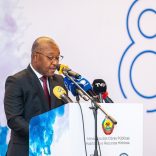Mozambique: Strengthened measures crucial to address drought in river basins
Mozambique’s debt reduction plan is not enough, more must be done – IMF

The International Monetary Fund said on Sunday that Mozambique’s plan to reduce public debt to sustainable levels was not enough and more measures were needed, starting with the strengthening of the public debt control department.
The IMF team argued that the Mozambican authorities need to “adopt a comprehensive debt strategy with the aim of bringing the debt rating from ‘High’ to ‘Moderate’ in the medium term and reducing financing needs to prudent levels,” the Debt Sustainability Analysis document reads.
In the document, produced under the IMF’s annual review of the Mozambican economy, and to which Lusa has had access, Fund experts say that “given the financing prospects, this will be difficult to achieve even following a scenario of implementation of a strong budgetary effort to achieve an equilibrium of the primary balance [excluding interest] in 2022, and more action will be needed”.
The positive but still insufficient scenario “implies the reduction of solvency indicators below prudent medium-term limits, which would be highly benefited by the realisation of gas megaprojects in 2023, along with a trajectory for indicators liquidity well below limits, to mitigate the risks associated with the high level of debt”.
For the IMF, one of the most pressing policy measures is to strengthen public debt management.
“Technicians urged the authorities to improve debt management. The capacity of the debt management unit in particular must be strengthened, in order to exercise effective oversight over the public debt portfolio, including public enterprises and loans that are part of cooperation agreements signed by other ministries”.
This is in addition to the “implementation of the recommendations of the IMF and the World Bank on strengthening governance, transparency improvements and accountability guarantees in the area of debt management, which are crucial”.
The Mozambique response, also mentioned in the report, indicates that the authorities “acknowledged the need to reduce medium-term financing needs and improve debt management, but had reservations about the pace of adjustment of the primary balance [excluding interest] recommended by technicians”.
In this regard, they reportedly explained that “they intend to actively restart the discussions on the restructuring of public debt owed to private creditors, as well as bilateral loans, with discussions with the six official creditors – Libya, Iraq, Angola, Bulgaria and Poland, as well as Brazil”.












Leave a Reply
Be the First to Comment!
You must be logged in to post a comment.
You must be logged in to post a comment.